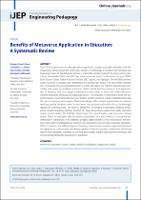| dc.description.abstract | The COVID-19 pandemic has brought about significant changes in people’s lifestyles, with the educational sector being one of the most reliant on technology to facilitate the teaching and learning process. In this literature review, a search for articles related to the metaverse in education, published in 2022 and 2023, has been conducted across six databases: Scopus, EBSCO Host, ScienceDirect, Taylor & Francis Online, IEEE Xplore, and Springer. The PRISMA methodology was used to analyze and systematize the manuscripts found. The aim of this research was to examine how integrating the metaverse into education can enhance educational accessibility and equity by enabling students to utilize virtual learning resources and opportunities. In addition, they can engage in interactions with others to learn and create interactive content during the teaching and learning process. This requires a commitment from the student because a connection between the student and the machine will be established through the use of emerging technologies. These technologies offer unique opportunities to enhance teaching quality, broaden access to education, and prepare individuals for an increasingly digital and evolving world. The analysis identified 14 emerging technologies: artificial intelligence, cloud computing, big data, Internet of Things, blockchain, augmented reality, extended reality, virtual reality, 5G, EON-XR, digital twins, 3D virtual reality, and immersive virtual reality. These technologies offer immersion (simulation of a real world in a virtual world), interactivity (interaction with different people), improvement of the educational environment (innovative presentation of content), and motivation for learning (capturing attention). When it comes to the different types of learning, there are six categories: experiential (based on experience), collaborative (involving a guide to lead the process), cooperative (involving teamwork), significant (building on existing knowledge), explicit (self-directed learning), and emotional (involving the regulation of emotions). | es_PE |


